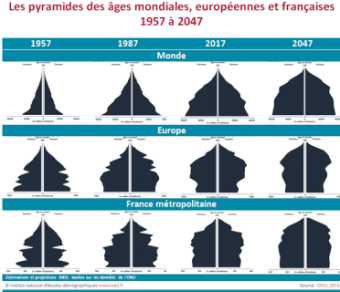Ageing and its multiple challenges
The ageing of the population is a consequence of the increased longevity of individuals, which has been achieved through advances in health, medicine and social progress. This progress has profoundly altered the conditions of individual ageing. Furthermore, demographic ageing is a consequence of changing population age structures, characterised by novel balances between the top and bottom part of the age pyramid. These balances are country-specific and contingent upon rising life expectancy.
These trends have led to massive transformations in the relationship between generations and a modification of the "stages" of the life cycle: education, intergenerational dependency, transition to adulthood, entering into couple and parenthood life, family and work life, retirement and old ages . It is by considering all of these stages and how they articulate that we can grasp the issue of old ages , which is at the forefront of multiple challenges:
- a quality of life and health challenge,
- a social challenge
- a political challenge
The research on ageing and old age
As longevity and ageing are inherently plural processes, they constitute a particularly fertile field of research in the humanities and social sciences. However, the field is also characterised by a lack of visibility and interdisciplinarity.
The Research group "Longévité et vieillissements" was established in 2014 and operated for four years. It was a a multi-organisation coordination structure that brought together more than 300 researchers in 29 teams (in anthropology, demography, law, economics, epidemiology, geography, history, psychology, public health, sociology). The group hled scientific meetings (thematic, methodological, data), an annual workshop dedicated to European calls for projects, a directory of members, a website and a newsletter.
A scientific interest group for of the research community
In order to unfold these activities within an appropriate framework, the CNRS, Inserm, Ined, Cnav, CNSA, Drees, EPHE, Université Paris Dauphine and Université de Lorraine created the GIS Institut de la longévité, des vieillesses et du vieillissement in 2018.
The ILVV facilitates the integration of scientific expertise and encourages the collaboration of researchers, institutions, and policymakers engaged in the formulation and implementation of public policies and social protection initiatives.
